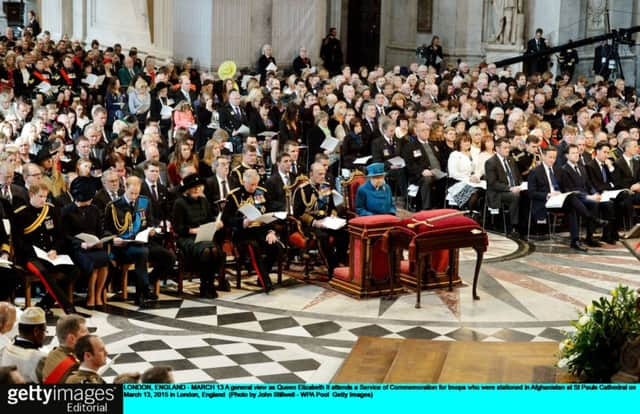Leaders: Legacy of the Afghanistan conflict


At such a time, some people would prefer to avoid a clear-eyed examination of the worth of Britain’s military foray into Afghanistan, for fear of diminishing in some way the sacrifice that was made there in young lives.
This is understandable, but misplaced. We do right by the young soldiers of future generations by scrutinising the Afghanistan experience for lessons that can be learned, both politically and militarily.
And some of those lessons are unavoidably difficult.
Advertisement
Hide AdAdvertisement
Hide AdLooking back, it now defies belief that John Reid, then UK defence secretary, speculated that the British mission in Helmand province could be completed without a shot being fired.
The wisdom or otherwise of the military decision that was taken to go hunting insurgents on the north of Helmand will long be debated by military historians.
But a more useful judgment on the conflict is whether the initial US/UK operation to invade the country in the aftermath of 9/11 was flawed right from the beginning.
Because in truth it is hard to see what has actually been achieved, in practical terms.
The stated purpose of the operation was to stop the Taleban providing a safe haven for al-Qaeda, and to close down the training camps from where jihadists had exported terror to the West with such chilling efficiency.
Inevitably, the public’s view of the Afghanistan conflict became bound up with its attitude to Iraq, and produced a very firm disinclination for any more UK military adventures.
This was demonstrated most dramatically in the House of Commons vote against attacks on President Assad’s government forces, in support of rebels in the Syrian civil war.
The question now being asked by international relations analysts is whether there are any circumstances in which the British public, and the MPs who represent them, would authorise the mobilisation of UK forces once more.
Advertisement
Hide AdAdvertisement
Hide AdWhat makes this more than just an academic question is the growing threat to Western interests and the stability of the Middle East posed by Islamic State.
In military terms, this is a force that holds ground, and has front lines. As such it is a far easier target than an insurgent group that can melt back into the indigenous population.
Military force against IS may well become necessary. And we should not let legitimate reservations about Iraq and Afghanistan cloud our judgment on whether or not this is the right course of action.
Courts need not fear technology
WE HAVE all seen enough courtroom dramas to know how the selective memories of witnesses can destroy a prosecution or defence case.
What witnesses could or couldn’t see, and what they did or didn’t hear, will obviously be harder to recall after the passage of months or years.
So the suggestion that the courts make use of video statements from witnesses at the scene of the crime, sometimes just moments after the incident in question, is one that seems logical.
It would remove the blanket of doubt that the passage of time inevitably casts over events, and makes them harder to recall with the certainty and confidence required in a court of law, when someone’s freedom is hanging in the balance.
Much of our legal system is still bound up in procedures that have remained largely unchanged since Victorian times. This is despite technological advances that have completely transformed the way we live our lives and – crucially – the way we record events.
Advertisement
Hide AdAdvertisement
Hide AdThe technology exists to make witness accounts far more reliable, so why do we not use it? The introduction of wearable cameras by police will make this a very practical debate very soon indeed.
Of course, there are some obvious objections – how can accounts of an incident be challenged by the prosecution or the defence if the witness is not actually in court during the trial?
But the case for greater use of technology in the investigation process and the criminal justice system seems inevitable, if only to ensure justice is not left in technology’s wake.
FOLLOW US
SCOTSMAN TABLET AND MOBILE APPS